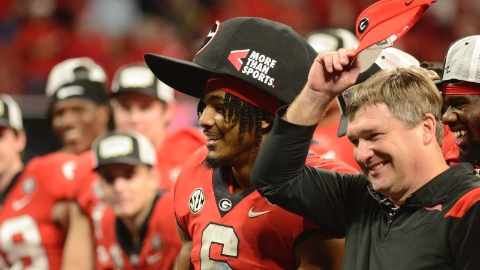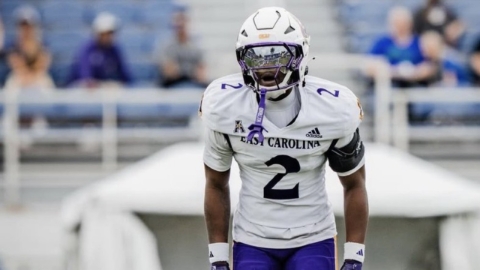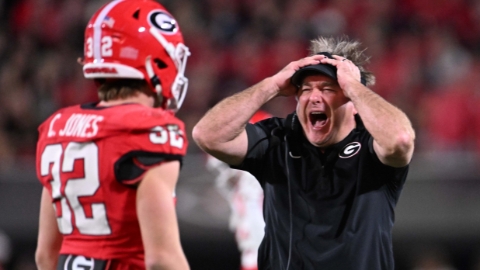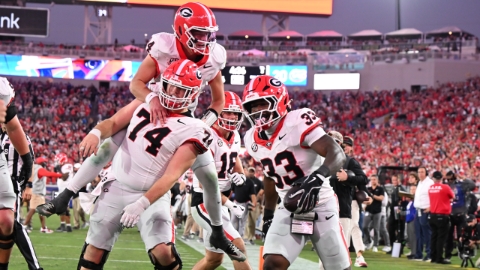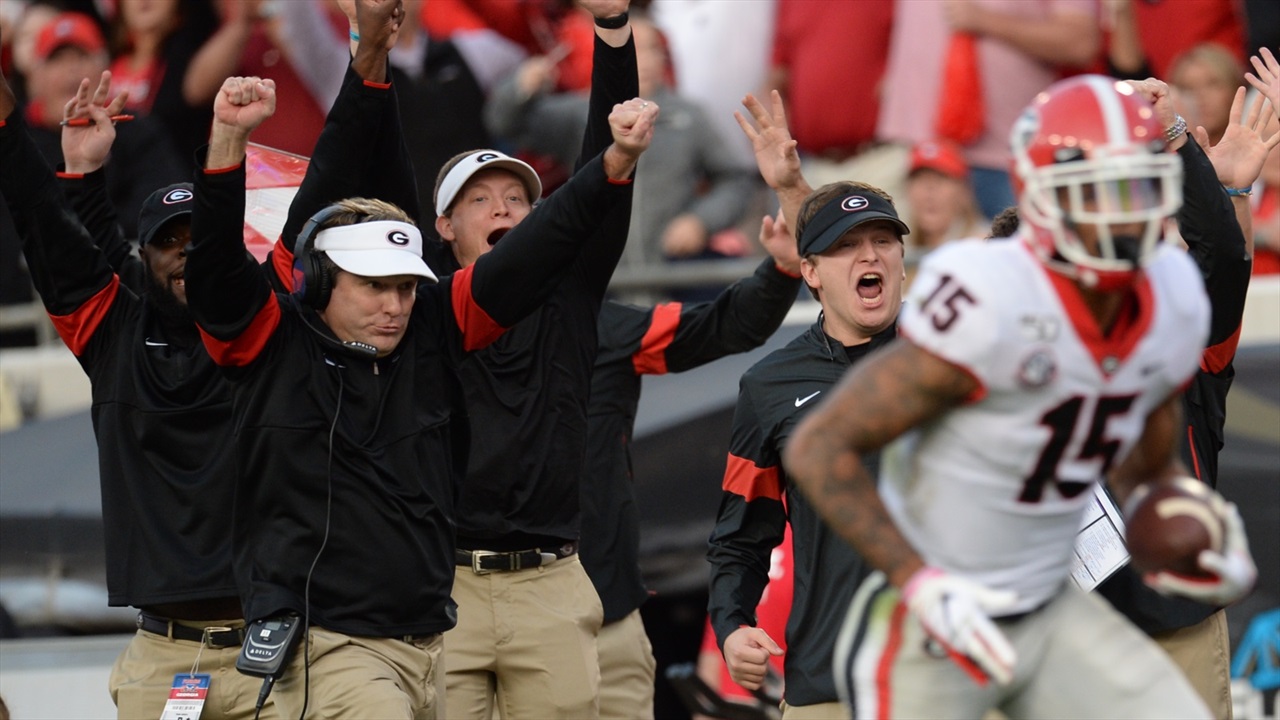
Real Georgia Fans Don’t Miss the Dawg Post Newsletter - Sign up now!
JACKSONVILLE - “How ‘Bout Them Dawgs?” a wide-smiling Mark Richt said to folks walking past him underneath EverBank Field moments after UGA Football’s 17-9 win over the No. 3-ranked Florida Gators.
Richt probably knew better and more acutely than anyone else just how important Georgia’s century old rivalry is with Florida - he lived it for 15 years. Then former UGA defensive back Kirby Smart took over the head coaching job at UGA with as much institutional knowledge about the game as any previous coach - and with nearly none of the coaching scars, but a few as a player.
Georgia-Florida, as it is known where the Bulldogs play, has been a or the pivotal game of the season for the Dawgs for decades. That’s the case this season, too. Kirby enters Saturday’s Cocktail Party with a 5-2 record against the Gators - the best start for a UGA coach against the Gators since Wally Butts and the Dawgs throttled the Gators over and over in the 1940s. Since then the game has ebbed and flowed.
Vince Dooley, Ray Graves, Doug Dickey, Charley Pell, Galen Hall, Ray Goff, Steve Spurrier, Jim Donnan, Richt, Ron Zook, Urban Meyer, Will Muschamp, Jim McElwain, Dan Mullen and now Billy Napier and Kirby have all paced the sidelines knowing and experiencing the importance of this game.
But why is this game so critical, and when and why did the game become so vitally important for both schools?
There are a slew of reasons why. The people, programs and location of the contest and its appearance late in the year on both teams’ schedules have made for the most unique annual spectacle in college sports… and perhaps in American sports itself.
“It is a unique game and setting to have the fan base split like that,” Richt said after the win over the Gators in 2012, perhaps his most consequential win over Florida. “I would think that if I am a fan and my team wins that day – having to walk through the other fans – it just makes it a lot easier. But when it is half and half I would imagine the fans get after each other a little bit.”
Then Richt said something that was and continues to be true today.
“We’ve been playing one another for a long time there. There’s a lot of history there since before I came along,” Richt said. “I showed up and it was a big deal, and I just kept thinking it was a big deal.”
It was a big deal. It is a big deal, and it’s only getting bigger.
Somewhere along the way college football changed – specifically in the SEC. As soon as the SEC split into divisions, the Georgia-Florida game took on monumental proportions.
In many ways the transition from the 1980s to the 1990s was when the Georgia-Florida game changed. Vince Dooley retired; Steve Spurrier was hired; and most importantly the SEC expanded and split into divisions. In a matter of four years Georgia slipped into a difficult decade, Florida got its act together, and the SEC title was decided with an SEC Championship Game.
But there was a time before the SEC expanded when the rivalry was already well established.
Eko Poly - Perfect for the backyard, beach or lake
Use the code: “DAWG15” to get 15% off & FREE Shipping!
20-Year Warranty | Made in Georgia
Vince Dooley’s Domination
Florida fans don’t like Vince Dooley, and with good reason. The Gators often had better teams heading to Jacksonville during the Dooley Era and lost. The best example of that came in 1985 when Florida arrived in Jacksonville ranked as the #1 team in the country for the first time ever.
The momentum was on the Gators’ side. After losing seven games in a row, including two heartbreaking losses in 1980 and 1981, the Gators knocked off Georgia in 1984 and rushed the field to celebrate. The 1985 game set up to be a Florida romp… it was anything but.
Georgia jumped out and dominated Florida on the ground with a power running game. The Gators left Jacksonville wounded. The SEC title, which had eluded Florida for its entire history was missed once more.
It was a jarring loss for the Gators, but it was par for the course for the rivalry. That was the theme of the pre-Spurrier days in Gainesville – no one cost the Gators more heartache than the Bulldogs
“The 1970s and 1980s were very simple,” Dublin native and longtime Georgia fan Don Hightower said before he passed in 2021. “People went to Jacksonville for two things – to go to the World’s Largest Outdoor Cocktail Party, and to watch Georgia win. Florida would go to Jacksonville with the better team, and Georgia would win. Georgia would go down with the better team and Georgia would win. They would go down there with teams about the same… and Georgia would win. It seemed like it didn’t matter… Georgia would always win.”
“For whatever reason, Florida would win here and there, but they couldn’t seem to get it done against Georgia. And a lot of people point the finger at Doug Dickey,” said longtime Gainesville radio host Mark McLeod. “When you talk to some of the older Gator fans, they just think it was coaching. Even when they had everything, Georgia would just upset them.”
Dooley, according to longtime Bulldog Loran Smith, had a major advantage heading into Jacksonville the Gators didn’t. Dooley and the Dawgs didn’t play Auburn the week before the way Florida did. Instead, Georgia played the Tigers the week after, and it showed in the results. Dooley’s Dawgs were 17-7-1 against the Gators, but 11-13-1 against the Tigers.
“Just look at the teams we used to play the week before the Florida game,” Smith said. “Then look at our record against Auburn the following week.”
“I think that was really something important to pay attention to,” Georgia Sports Information Director Claude Felton said. “Playing two games back-to-back like that is very difficult to do in the SEC.”
The Gators would spend tons of emotional energy in their rivalry game against the Tigers and often came in spent. Georgia didn’t care. It just wanted to win, and more often than not it did.
While Georgia’s domination of the Gators is well noted before Spurrier’s arrival, no moment sticks out more than Lindsey Scott’s 93-yard run to glory in the national title season of 1980.
That year is viewed romantically in the lore of Georgia football history, but the game with Florida that season was hardly looking promising after the Gators grabbed a 21-20 lead late in the game.
The Gator Bowl, painted in orange with its ticket takers in Florida orange and blue was the sight of the most famous play in Bulldog football history. But because it is quite obviously not a home game, Uga handler Charles Seiler, who was a student at the time, already had the school’s famous mascot packed up and ready to leave the game site.
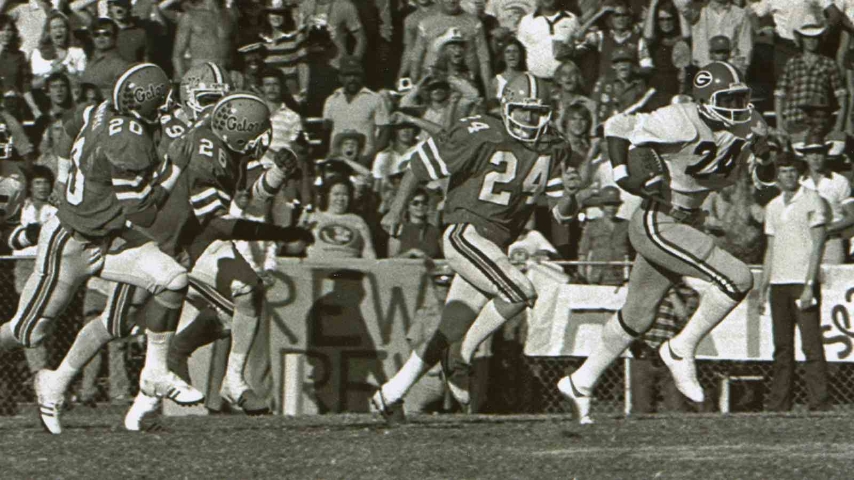
“For some reason I didn’t have the dog on my wrist at the time,” Seiler remembered. “We have a rule at other fields that if we are losing with about five minutes to go we try to get the dog ready to go. So I didn’t have the dog at the time. I guess he was in the car or in the locker room at the time.”
Uga’s whereabouts may have been unknown, but Georgia’s wasn’t. Buck Belue and company were camped in the shadow of their own end zone… and on the path to being upset by hated Florida.
Seiler was in the opposite corner of the Gator Bowl near the old chain link fences the facility had surrounding the field.
“Since I was in the end zone you could see Lindsey catch and run, but the Gators couldn’t get him. I got the view of everyone chasing him. After that it was crazy… bottles and cups were flying past my head,” Seiler recalled.
The reaction of Georgia fans after the play concluded and the season seemed saved was indicative of the atmosphere surrounding the event, and perhaps a good example of why the event got its nickname – the World’s Largest Outdoor Cocktail Party.
“One of the things I remember very clearly was that someone threw a partially-filled 5th bottle of liquor – it whizzed by my head just as Lindsey was running at me. People were going crazy,” he said.
Maybe it was a good thing Uga was nowhere to be found.
“At the end of the day I am just trying to keep the dog alive,” Seiler said.
Part of the reaction to Georgia’s last-minute win that was that the team stayed undefeated. Part of the romantic notion surrounding the game was that it was national title season. But a lot of the legendary status of that play was that it came in the old Gator Bowl against the hated Gators. All of those things combined make for the defining moment in more than 130 years of Georgia football.
Would the play have been looked back at with the same sort of love had it come against Tennessee or South Carolina?
No, because the game with Florida is special the way those two contests are not. Keep in mind that Georgia had two critical contests with those two programs earlier that season. Herschel Walker’s explosion on the college football scene came in a come-from-behind 16-15 win over the Vols in Knoxville.
Walker’s mark was left for sure, but it wasn’t Lindsey Scott.
The week before the 1980 Florida game, No. 4 Georgia hosted No. 14 South Carolina in Athens. The game, at the time, was viewed as perhaps the major hurdle to an undefeated season for Georgia, but the Dawgs’ 13-10 win over the Gamecocks is largely forgotten because of the lack of rivalry between the two schools, and the fact that the win was massively overshadowed by Lindsey Scott the next weekend.
Florida, as it turns out, was a critically important game back then. That’s why it made what happened after 1990 much more difficult for Georgia fans to stomach.
Spurrier Turns the Sinking Ship Around
Florida, for decades, had been the keystone cops when it came to winning. The Gators would usually have pretty good talent (sometimes very, very good talent), but would figure out ways to lose important games when they needed to win them.
More often than not the Gators simply could not get past SEC rivals Georgia and Auburn enough times to prevent those two or Alabama from winning the championship.
Florida, for the bulk of its history, was a bunch of losers when it counted.
Then came Steve Spurrier, the former Gator quarterback who won the Heisman Trophy, but never won the SEC title… mainly because of the Bulldogs.
After a stint in the USFL and after winning the ACC title at lowly Duke, Spurrier arrived in Gainesville the spring of 1990 with one thing on his mind… beating Georgia on the way to becoming SEC champions.
Spurrier knew, likely better than anyone else, that Georgia was in the way of the Gators and their championship hopes. He wanted to change the trajectory of the series. So he did two things right off the bad. Spurrier made sure the Gators had the week off before the Georgia game. He also knew Florida would have to get over their fears of the Gator Bowl. So, intelligently, Spurrier changed something. He scheduled the Gators to have their annual spring game at the Gator Bowl his first year there in 1990.
That year the old ball coach wasn’t able to hold the spring scrimmage in Gainesville as the Gators’ stadium was being renovated – leaving the turf unavailable for use. But the construction at the stadium gave Spurrier a way to help build his team’s mental toughness in other ways.
Spurrier, as has been well documented, was more than tired of Florida being nervous about playing in Jacksonville, so he made sure Florida would win there at least once that season – in the spring.
“He had options, but he wanted to go to Jacksonville. Spurrier has always had a love for Jacksonville,” McCleod said. “There was no way they could have played in the Swamp (because of construction). The first place he could have done it was Tampa. No one thought it would be Orlando. I don’t know why he picked Jacksonville – maybe it was a little bit about Georgia. I wouldn’t be a bit surprised that he wanted to do it on a field they actually played on.”
Florida, at the end of crippling NCAA sanctions imposed on the program for widespread major infractions, was not eligible for the SEC title or a bowl game that season. But Spurrier and his Gators were clearly a different program from the start.
“When Spurrier came in 1990 there was so much hope,” McCleod said. “I’m not trashing Charley Pell, but it didn’t take long for (the hangover from Florida’s probation) to go away. With Spurrier you had a head coach who did things the right way. I think everyone knew in 1990 Florida was on the right track.”
McCleod pointed out that the Florida spring game at the old Gator Bowl was critical for the Gators. Spurrier needed to establish who his quarterback would be, and the spring game would be the important moment in that process.
“That spring game in 1990 was the game that brought Shane Matthews in as the quarterback at Florida, and he was as pivotal as anyone else. The rest is history,” McCleod said.
The Gators had their quarterback, and even though they were on probation they won – and won big. Florida’s 6-1 record was the best in the SEC. It was a sign of things to come for Florida.
Meanwhile, 1990 was one of the longest in school history for the Bulldogs. At 4-7 on the season, Georgia watched as its in-state rival Georgia Tech claimed a share of the national title and watched while the Gators turned things around.
Florida’s 38-7 win over Georgia that year was the Gators’ most lopsided win in series history. 1990 was a low point in so many ways for Georgia, but the Bulldogs’ struggles with the Gators were only just beginning.
From 1990 to 1996 Florida won five SEC titles and a national title. Along the way they dominated Georgia – beating the Bulldogs by an average score of 45-15. The games became more competitive after Georgia’s 37-17 upset of the Gators in 1997, but Spurrier turned the momentum of the series to the Gators for the first time since a ten-year stretch from 1952 to 1963.
Florida was on its way to winning 13 of 14 contests, and Georgia was playing the part of whipping boy for the first time in a long time during the series. Even Mark Richt’s SEC Champion Bulldogs of 2002 were unseated by Ron Zook’s underwhelming squad, which showed just how much the events had move towards the Gators.
“No one had a bigger lead on Florida than Georgia. I thought I’d never see the day when Florida closed the gap with Georgia, but they closed the gap because of Spurrier,” McCleod said.
Would Florida have ever gotten its act together without Spurrier?
Probably not.
“Florida, the program, is so superior to what it was in 1989,” McCleod added. “Georgia had already experienced success, but Florida had experienced none. They’d had no SEC titles before 1991. That’s the reason the game has ramped up. People see Florida now, and they don’t hope to win the SEC. They think: ‘We can win the SEC and the national title.’”
Everything changed because of Spurrier in 1990 the same way everything changed for the Bulldogs because of Dooley in 1964. The duo is probably the most consequential personalities in the history of the event.
More Than a Game
What makes the rivalry that is Georgia-Florida different than everything else? There is a simple answer to that simple question – everything. There is nothing in the country, save the Oklahoma-Texas game, that comes close to replicating the split of fans in the stands. Actually, the half-and-half split of fans is unique in American sports to those two games.
But Georgia-Florida, for a long time, was a more important game for the Gators and Dawgs because the game was a conference affair, and because the game is played so late in the season.
Those two factors combined to make the Cocktail Party a death sentence more often than not for the loser of the game. The contest has consistently prevented both schools from winning the conference title over the decades.
The same can’t be said for Oklahoma-Texas. The Red River Rivalry wasn’t a conference game before 1996. The game was still the most important game on the schedule for both the Horns and Sooners, but it didn’t affect who did or did not win the conference championship. Often the loser of the contest went on to win either the Big Eight or Southwest Conference titles. Also, the game has always coincided with the Texas State Fair in early October – meaning half the season is left to be played when the teams leave the Cotton Bowl turf.
Georgia-Florida, quite frankly, is a terminal game. The loser is pretty much done for the year.
The ramifications of what happens on the field in Jacksonville is certainly more important than what happens off it, but the lead up to the game can’t be ignored. The Red River Rivalry has the Texas State Fair with all of its fried Snickers bars and Ferris wheels, but it doesn’t have the mixed parking lots, RV City, St. Simons Island and the Landing – these are classic Georgia-Florida stops for fans on their way to and from the game.
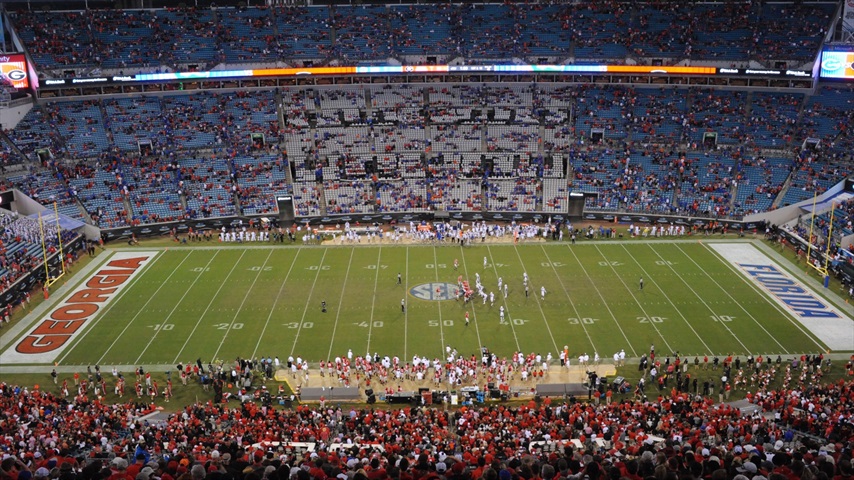
“It’s more like a five-day event… not a football game. You never hear that about Texas-Oklahoma, Auburn-Alabama and Ohio State-Michigan,” McCleod said. “I think the entire town gets going because of that game. The game starts in Jacksonville on Tuesday… it is crazy. You see these RVs going up to Jacksonville, and you know where they are going. It is nuts. It’s not like it’s two RVs there – there are tons of them. You are like: ‘My God’ the game is not still for days, and these people are here.”
“It’s the only game I go to where there are tons and tons of fans there well before the game,” Smith said of the Jacksonville event. “I go into the game early because of the radio broadcast, so I see the stadium and its surroundings before anyone is usually there. But you can’t miss the people at the Florida game… they are everywhere.”
“It’s like a bowl game in the middle of the year. That’s what makes it different,” Seiler said.
Carter Strickland, who covered the Bulldogs for the Atlanta Journal-Constitution before moving on to ESPN says the two games are similar, but that Georgia-Florida has more passion to it.
“You can really tell that the two sides hate one another,” he said of Georgia-Florida. “I’m not sure you get quite the same sort of passion for the game in Dallas.”
The Cotton Bowl, where Texas and Oklahoma do battle, spills out into the Texas State Fair and is considered one of the most historic stadiums in the country. The Gator Bowl (now rebuilt and called EverBank Field) is fondly remembered on both sides of the rivalry for being clunky structure, but earsplittingly loud.
“It was a huge stadium that no one used,” McCleod said. “More than 80,000 people in the stadium… it was massive, but there was nothing special about it. There were no club seats. “Everyone referred to it as the Gator Bowl – even before they played the actual bowl game there. To Floridians the Gator Bowl is known more for Florida-Georgia than the actual bowl game that is there.”
“The new stadium is very nice, but I can still remember the way the Gator Bowl was – it was metal,” Seiler said. “You could hear footsteps, and people would beat their feet, and it was very, very loud.”
“That’s the thing about that game that makes it special, too,” Felton said about the stadium. “We used to have the fans split into quarters – so from the 50-yard line to the middle of the end zone – then the end zone to the 50-yard line and on. It made for a lot of fan interaction.”
So much so that when the old Gator Bowl was knocked down in place of the new structure, Florida and Georgia decided to split the stadium down the middle.
“That’s because we wanted to make sure that there were only two areas of the stadium where the fans met rather than four,” Felton added.
The mixture – that is the unavoidable nature of this rivalry – is what makes the weeklong event in Jacksonville so passionate. Felton adds that distance, believe it or not, makes the game important, too.
In Dallas, Texas and Oklahoma are equally about three hours from their campuses when they kick off at the Cotton Bowl. Georgia, on the other hand is significantly further away from its home in Athens than the Gators and their home in Gainesville. That makes for a longer ride for the Bulldogs to be sure, but makes for a shorter ride for many of their most passionate fans in South Georgia.
“I think for a lot of the South Georgians this is their ‘home’ game,” Felton, a native of Savannah, said. “It takes them longer to get to Athens than it does to Jacksonville, so they think of it as the one home game they have each season.”
Bulldog fans and students pour into the coastal area of Georgia the nights before the game to take in sun and fun before the three-hour game on Saturday. Many board buses from Georgia’s Golden Isles with plenty of liquid lubricant to get themselves ready for the game. The University itself has now scheduled its fall break to coincide with the annual contest, so students have used the game as an excuse to get out of Athens in order to hit the beaches for the final time of the year.
In many ways the game in Jacksonville is as much if not more of a social event than any game in Athens. Jacksonville, in reality, is a party that drags on for days and nights… win or lose, but winning is preferred.
The Panic
Florida and Georgia both know about dark times in the rivalry. Even though Georgia has won the last two games, both programs have split the last six contests and some balance has been established in the rivalry for the first time in more than 100 years of playing. Or does it just seem like balance
There are very few times in the century-long rivalry that the series has gone back and forth. From the start of the series until the 1950s Georgia ran away with wins. Florida struck back in from 1952 until Vince Dooley was hired in 1964. From that point until Spurrier arrived in 1990 Georgia won all but eight games – with one tie in 1969. The program Spurrier established that year won 13 of 14 games. Since then Florida has won five games, and Georgia has won four.
“You can’t overlook the fact that both programs have lived under the other one’s thumb for so long,” said Josh Kendall, who covered Georgia for more than a decade and then covered Spurrier at South Carolina. “That leads to a lot of dislike.”
Perhaps that’s the reason why Georgia fans look forward to the Florida game more than any other game of the season, but have apprehension about it at the same time.
Florida, it turns out, still thinks of Georgia as the biggest game of the year, too.
“I know people who still think the most important game of the year is always going to be Florida-Georgia,” McCleod said. “And it is always going to be that game. There have been a lot of ‘you’ve got to be kidding me’ moments in this rivalry.”
Even with all of the college football on TV today, and with all of the passion surrounding games with Auburn, Georgia Tech and Tennessee, Georgia’s game with Florida remains the program’s most consequential game of the year every year – now more than ever.
Maybe that’s why Mark Richt was smiling so broadly after the win in 2012. Maybe that’s why Kirby parties with his players in the end zone after a win these days.
It is a party after all - a Cocktail Party like none other.


